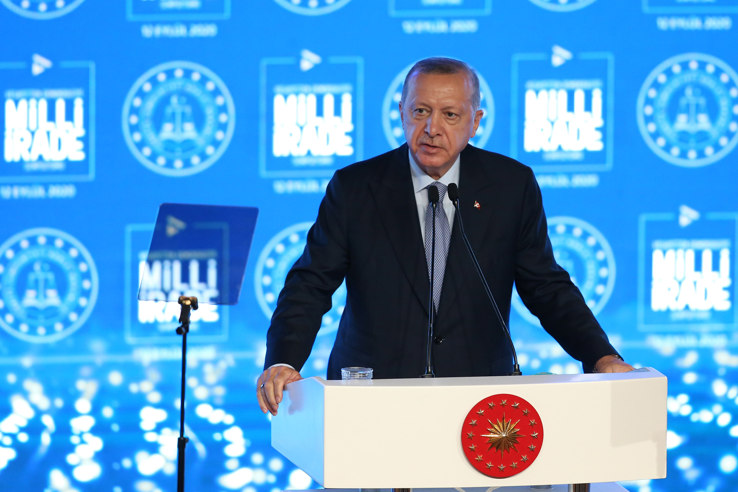

Turkey's TRT blames India for Pakistan-based Islamist violence in Bangladesh (Photo: IANS)
<p>
Turkey&rsquo;s media bullhorn TRT has glossed over the nefarious Pakistan-backed tide of Islamic fundamentalism, and, instead, blamed the policies of the Modi administration for the surge in extremist violence that followed Indian Prime Minister Narendra Modi&rsquo;s head turning visit to Bangladesh.</p>
<p>
TRT world channel quoting German-based Bangladeshi political analyst Zia Hasan has slammed the government of Prime Minister Sheikh Hasina&rsquo;s for its critical reliance on India for the violence. Hasan pointed out that &ldquo;Prime Minister Sheikh Hasina has been able to stay in power only because of India&#39;s support. India backed Hasina and favoured the election, ensuring her stay in power and quelling US and European resentment over the legitimacy of the new government, followed by a landslide victory in another election in 2019.&rdquo; He however conveniently ignored that Bangladesh under Hasina is emerging as an economic powerhouse. It has also emerged as a major link between South Asia and the 10-nation Association of South East Asian Nation, which is at the heart of turning the Indo-Pacific as the locomotive of the world economy.</p>
<p>
The channel from Turkey&mdash;a firm ally of Pakistan after Saudi Arabia and the six-nations Gulf Cooperation Council turned its back on Islamabad&mdash;then asserted that the anti- Modi protests can be attributed to three major developments.</p>
<p>
First, it peddles the worn-out argument that deep seated resentment against Modi&rsquo;s alleged role in the 2002 Gujarat riots was behind the violence. Second it cited the so-called &ldquo;deteriorating human rights situation in Jammu and Kashmir&rdquo; as another trigger point. The outlet then citied the Modi administration&rsquo;s &ldquo;various controversial steps such as the National Citizens Registration (NRC) and the implementation of the Citizenship Amendment Act (CAA),&rdquo; for fuelling the attacks.</p>
<p>
But the channel conveniently excluded the rise of Pakistan backed fundamentalist forces for the organised and pre-meditated violence, meant to tarnish the beginning of the second phase of special ties between New Delhi and Dhaka, which were forged during the throes of the 1971 war of liberation triggered by the well documented genocide perpetrated under the notorious Operation Searchlight. &nbsp;</p>
<p>
Setting the record straight, The Hindustan Times is reporting that the violent protests was the first major action by the hardline Islamist group Hefazat-e-Islam after it was taken over by Junaid Babu Nagari who has a strong Pakistani connect. The daily reported that Babu Nagari a Hadith scholar studied in Pakistan&rsquo;s Jamia Uloom-e-Islamia for four years. He elevated himself as the group&rsquo;s chief at the end of a bitter power struggle that peaked after the death of its Amir Shah Ahmed Shafi in September last year.</p>
<p>
Indian officials who have been tracking activities of Hefazat-e-Islam, which translates as Protection of Islam and claims to be a non-political front, said the organisation first came to notice of the authorities for protesting the 2009 policy for equal inheritance rights to women. The organisation rose to prominence in 2013 when it sent students from its nationwide network of madrasas to Dhaka to counter the &ldquo;Shahbagh movement&rdquo; of students demanding the death penalty for all war criminals of 1971. The Hefazat-e-Islam placed a list of 13 demands including punishment for atheist bloggers and changes to textbooks.</p>
<p>
There, however, has been a marked difference after the change of guard in November. Unlike its founder Shah Ahmed Shafi who was often perceived to be soft on the ruling Awami League, Hefazat-e-Islam under Junaid Babu Nagari has the tacit support of the Khaleda Zia&rsquo;s Bangladesh Nationalist Party and fundamentalist groups such as the Jamaat-e-Islami.</p>
<p>
For instance, the BNP did not formally extend support for the general strike called on Sunday but pointedly asserted that the call for the strike was logical.</p>
<p>
Diplomats in New Delhi and Dhaka suggest that the links between the Hefazat-e-Islam and the BNP could become more visible with Babu Nagari&rsquo;s elevation as he seeks to turn the notorious group into a political force.</p>
<p>
Senior Bangladeshi journalist Mahfuz Anam seemed to agree. In a recent commentary, he said the real reason for the protests against PM Modi&rsquo;s visit was to signal that Hefazat-e-Islam under its new leadership was not the same party that Shah Ahmed Shafi had led.</p>
<p>
Anam, the editor of Bangladesh&rsquo;s largest English-language newspaper, The Daily Star, also blamed the Sheikh Hasina government for practising a policy of appeasement which, he said, had made the Hefazat-e-Islam stronger and more determined to challenge the fundamental character of the country.</p>
<p>
Indian officials said they had spotted efforts by Islamic fundamentalist forces to unite for further Islamisation of the society. The Hefazat, under its new leadership, is attempting to emerge as the leader of these fundamentalist groups.</p>
<p>
The radical group has given a nationwide strike call on April 2 to protest the police crackdown in what, an Indian official said, was a continuing effort to radicalise Bangladeshi society by its potent mix of religion and power politics.</p>
Prime Minister Narendra Modi had a "fruitful conversation" with Finnish President Alexander Stubb on Wednesday…
US Vice President JD Vance is scheduled to visit India next week. He will meet…
In a first, Indian Railways has installed an ATM on a trial basis -- on…
Commerce Minister Piyush Goyal met a delegation from Elon Musk-owned satellite internet services company Starlink.…
The United States has enacted restrictions on the export of Nvidia's H20 chips to China,…
BusinessWire India QpiAI, a leader in quantum computing and generative AI, announced its First Quantum…